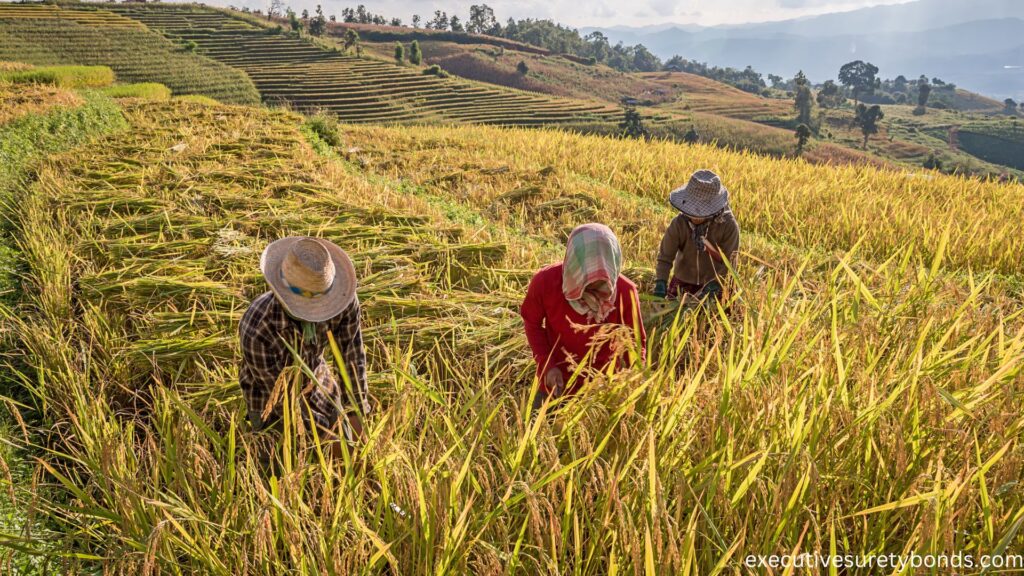Introduction
In the robust plains of Washington State, an industry quietly yet significantly contributes to the economic tapestry: grain dealers and warehouse operators. Not only do they support the livelihoods of local farmers, but they also ensure that grains – a staple in our diets – are safely stored and transacted. Amidst the sea of golden fields, there is an unseen safety net, the Washington State Grain Dealer and Warehouseman Bond, safeguarding the interests of farmers and their precious yields. But what exactly is this bond, and why is it indispensable to the grain industry in Washington State? Let’s delve into the grains of this topic, ensuring that the roots of understanding grow strong and deep.
The Essence of the Bond
At its core, a bond is a type of insurance. Specifically, the Washington State Grain Dealer and Warehouseman Bond is a financial assurance tool designed to protect grain producers in the event that a grain dealer or warehouse operator fails to pay for the grains purchased or mishandles them during storage. Imagine a situation where farmers, after months of nurturing their crops, hand them over to a warehouse for storage or a dealer for sale. This bond guarantees that they will be compensated, even if the dealer or warehouseman acts unethically or goes bankrupt.
Components and Stakeholders
Three principal actors participate in this bond process: the Obligee (the state, representing the public or grain producers), the Principal (grain dealer or warehouseman), and the Surety (the insurance or bond company). The Obligee mandates the bond to safeguard the grain producers, the Principal purchases the bond, and the Surety ensures that compensation is available to the Obligee if the Principal fails in their obligations.
Purpose and Significance
- Financial Security: The bond shields grain producers from financial loss, providing a safety net when the unexpected happens – such as when a dealer defaults on payment or a warehouseman mismanages stored grains.
- Regulatory Compliance: Dealers and warehouse operators are required to obtain these bonds as part of their licensing requirements, ensuring that only compliant businesses operate in the market.
- Consumer Confidence: Knowing that a safety net exists, farmers are more likely to engage with dealers and warehouse operators, ensuring that the grain market thrives and that consumers have consistent access to grain products.
The Impact on Farmers and The Economy
This bond is not just a tool; it is a linchpin ensuring stability in the agricultural sector, particularly for grain producers. Farmers, often operating on razor-thin margins, can be devastated by a single financial setback. By having this financial assurance, farmers are more empowered to cultivate grains, contributing to both local and global food supplies, and bolstering the agricultural sector of Washington State’s economy.
Global Perspective
Grain is not just a local commodity; it is traded on the global stage. The practices and policies implemented in Washington State could serve as a model for other regions, ensuring that the veins of the global grain trade pulse with integrity and reliability. Consistency and trust in the system allow for a healthy international trade environment, contributing to food security across the globe.
Educational Implication
Engaging youth, especially those in the 11th grade considering their future careers, this topic underscores the multifaceted nature of agriculture, combining elements of finance, ethics, and international trade. This bond illuminates how each sector of society is interlinked and emphasizes the importance of ethical business practices, financial foresight, and robust regulatory frameworks.
Conclusion
The Washington State Grain Dealer and Warehouseman Bond stands as a sentinel, ensuring that the economic wheels of the grain industry churn smoothly, safeguarding those who till the land and sow the seeds. It is a testament to a system that, when well-structured, provides security and prosperity for all parties involved, from the hardworking farmer to the consumer enjoying the bountiful products of the earth. Nurturing an understanding of such financial and regulatory mechanisms not only enriches our knowledge but also seeds the future of ethical and sustainable business practices in the generations to come. Thus, the true harvest is not just the grain itself but a future that is securely and ethically bound.
Frequently Asked Questions
How does the Washington State Grain Dealer and Warehouseman Bond Impact Small-Scale and Organic Farmers?
While the bond inherently provides protection to all grain producers in Washington State, its impact can be especially significant for small-scale and organic farmers. These farmers often operate with limited resources and financial reserves, making them particularly vulnerable to losses. If a dealer defaults on payment, or a warehouse fails to properly store their specialty grains (which might have higher market prices due to organic labels), the bond acts as a financial safeguard, ensuring they receive due compensation. Additionally, it can facilitate the operation of niche markets, such as specialty organic grains, by providing an element of financial security that might encourage small-scale farmers to continue production despite the inherent risks.
Can the Washington State Grain Dealer and Warehouseman Bond Influence International Relationships and Trade?
Surprisingly, yes! While on the surface it may seem predominantly state-focused, the Washington State Grain Dealer and Warehouseman Bond can have a ripple effect on international trade and relations. Grains produced in Washington State may enter global markets, and international buyers need assurance regarding the reliability and quality of their purchased grains. The bond fosters a stable and trustworthy grain market by ensuring financial security and ethical practices among dealers and warehousemen. This environment of trust and reliability can boost Washington State’s reputation on the international stage, fostering healthy trade relationships and potentially attracting more international buyers.
What Happens When Both a Grain Dealer and a Warehouse Operator Violate Their Obligations Simultaneously?
An intriguing scenario unfolds when both a grain dealer and a warehouse operator violate their obligations concurrently, which might involve a complex legal and financial resolution process. The bond acts as a surety for compensation, but multiple violations might involve distinct compensation processes for producers affected by each violation. The Surety, which guarantees the bond, may need to pay out to affected parties. However, they will likely seek reimbursement from the offending dealer and warehouseman, potentially through legal means. It might complicate matters further if both entities (dealer and warehouseman) are interconnected or co-owned, and would require meticulous navigation through legal channels to ensure that all affected parties, especially the grain producers, are adequately compensated for their losses. This underscores the bond’s vital role in maintaining ethical practices and providing a safety net within the grain trade.

